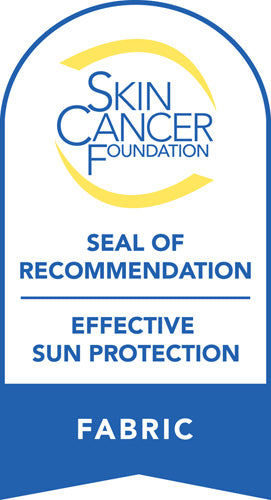Can you get sunburn through clothing? Spoiler alert, the answer is yes! Learn why regular clothing isn’t enough.
Picture it: you're having a wonderful day hanging out on the patio. But when you get home, you notice you have a wicked sunburn. You're shocked - you were fully covered up the whole time!
Is that even possible? We've got the 411.
Read on to find out, can you get sunburn through clothes?
Can You Get Sunburn Through Clothes?
Yes, you can still get sunburned through clothes, especially if the clothing is thin or made of light fabrics. While clothing provides some level of protection from the sun's ultraviolet rays, not all fabrics and clothing provide the same level of protection.
The amount of protection clothing offers largely depends on the type of fabric, its color, and its thickness. Some fabrics, like tightly woven fabrics or those with special coatings or treatments, offer better protection against UV rays.
Dark-colored and tightly woven fabrics tend to offer more protection than light-colored and loose-knit fabrics.
Additionally, certain areas of the body may be more susceptible to sun exposure, especially if the clothing in those areas is thin or not tightly woven.
It's important to be as careful as possible when you're out in the sun. Preventing sunburns can help you prevent skin cancer, after all!
Sunburn Risk Factors
There are factors that could make you more prone to sunburns, even when you're wearing clothing.
People with fair skin, light hair, and light eyes are more susceptible to sunburn because they have less melanin. Melanin provides some natural protection against UV rays.
Prolonged or intense exposure to UV radiation increases the risk of sunburn. This includes spending extended periods in the sun, especially between around 10 a.m. and 4 p.m. when the sun's rays are the strongest.
Higher altitudes and places that are closer to the equator have more intense UV radiation, increasing the risk of sunburn. You may have a higher risk depending on where you live. You may also want to do research when you go on vacation to ensure you're properly protected.
Surfaces like water, sand, snow, and concrete can reflect UV radiation, intensifying exposure and the risk of sunburn.
Some medications, such as certain antibiotics or acne medicines, can make your skin much more sensitive to sunlight, increasing the risk of sunburn. Certain skin conditions can also make the skin more susceptible to sunburn.
Tanning, whether natural or through artificial means like tanning beds, damages the skin and increases its vulnerability to sunburn.
Preventing Sunburn Through Clothing
UV-blocking clothing is a great way to prevent yourself from getting sunburned through clothes.
There are lots of options for clothing that blocks UV rays. Consider purchasing clothing with UPF (Ultraviolet Protection Factor) labels. UPF indicates how effective the fabric is in blocking UV rays. Higher UPF values provide better protection.
Wear sun-proof clothing that covers as much skin as possible, including long-sleeved shirts, long pants, and large hats that shade your whole head.
Use sunglasses with UV protection to shield your eyes and the sensitive skin around them.
Be aware that clothing may stretch, especially when wet, potentially reducing its sun protection properties. Consider reapplying sunscreen after swimming or if your clothing becomes wet.
Opt for clothing that is both protective and breathable, allowing airflow to keep you cool while also providing sun protection.
UPF 50+ clothing is particularly important. Unlike sunscreen that may wear off or require reapplication, UPF clothing provides consistent and long-lasting protection throughout the day. Make sure the brand you choose is properly testing their clothing.
Dressing For The Occasion
Dressing appropriately for various outdoor activities is a fundamental aspect of preventing sunburn through clothing.
For hiking and outdoor exploration, opt for lightweight, moisture-wicking, long-sleeved shirts and pants made of breathable, UPF-rated fabric.
Choose earth-toned or darker colors to blend in with the environment. This will also help provide better UV protection.
When spending time at the beach, wear sun-protective UPF 50 swim shirts and rash guards. Cover up with a loose-fitting, long-sleeved cover-up or beach shirt when not in the water.
There are UPF 50+ options for cover-ups to double-up on protection. Don't forget to apply plenty of sunscreen to exposed areas like your face, neck, and feet.
For gardening or yard work, wear long pants, a full-coverage shirt, and a wide-brimmed hat to shield your skin from the sun. Choose moisture-wicking fabrics to stay cool. Consider wearing proper gloves to protect your hands and apply sunscreen on exposed areas like your face and neck.
Is running your workout routine of choice? Choose lightweight, long-sleeved shirts and leggings or running pants with UPF protection. Consider wearing a running cap or visor to shade your face. Apply sunscreen on any exposed skin areas.
More Sunburn Protection Strategies
Along with wearing UV-blocking clothing, there are other measures you should take to prevent sunburns.
Use a broad-spectrum sunscreen with a high SPF (30 or higher) and apply it to all visible skin, even on cloudy days.
Sunscreen needs to be regularly reapplied, especially if you're sweating or swimming. Even waterproof sunscreens can lose their effectiveness after extended water exposure, making reapplication crucial for continued protection.
Different skin types require specific sunscreens. Those with sensitive skin should opt for mineral-based sunscreens with zinc oxide or titanium dioxide, while others might prefer chemical sunscreens. Finding a sunscreen that suits your skin type will encourage consistent use.
Limit sun exposure during peak UV radiation hours, typically between 10 a.m. and 4 p.m. If you're outdoors, stay in shaded areas, especially when the sun's rays are strongest.
Use a lip balm with SPF to shield your lips from sun exposure and prevent sunburn.
Perform regular skin checks to monitor moles, spots, and any changes to your skin. If you notice any changes, talk to a dermatologist ASAP.
Staying hydrated is vital in preventing sunburn. Proper hydration helps regulate body temperature and aids in maintaining healthy skin, making it less susceptible to damage from sun exposure.
Can You Get Sunburn Through Clothes? Now You Know
Can you get sunburn through clothes? Yes, but there are prevention techniques out there for you. Hopefully, you'll now be able to keep yourself burn-free no matter the weather.
Are you ready to start shopping for UV-resistant clothing? BloqUV has options that will keep you looking your best while you protect yourself from the sun's rays.



